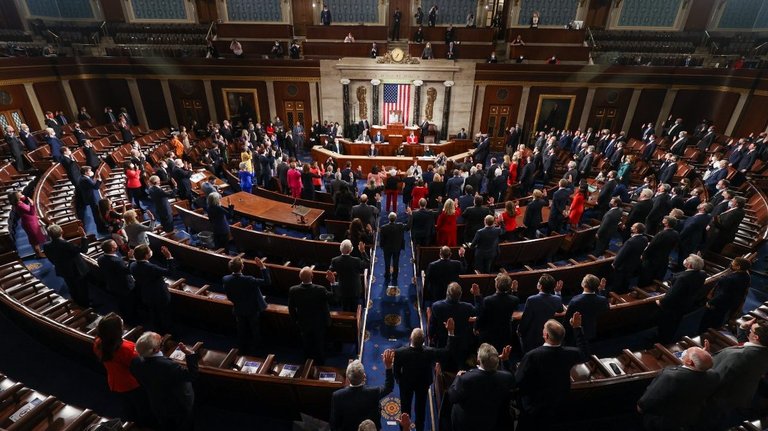For years, the Díaz-Balart name has exerted a harmful influence on Cuban affairs from the U.S. legislative branch. To make matters worse, it has been a while since Mario Díaz-Balart is the leader of his party in the House Appropriations Subcommittee in charge of budgeting Foggy Bottom. Thus, when Republicans dominate the so-called low chamber, Díaz-Balart controls the drafting of the legislative proposal funding the State Department's operations, which allows him to write into law his stultified and poisonous anti-Cuba agenda.
Last week the Cuban Foreign Ministry issued an official note denouncing one of the measures proposed by Diaz-Balart in the State Department appropriations bill for fiscal year 2025. Although there are several areas targeted by the Cuban-origin congressman, beyond the indefensible permanence of Cuba on the list of state sponsors of Terrorism. The Senate Appropriations Subcommittee with the same functions has yet to pass its own bill, which is usually less rhetorical and aggressive even when it is held by Republicans, which is not the case now.
 Source
SourceThe anti-Cuban gang has an advantage here because the directions in the House report are usually those with which the State Department must ultimately comply. In any case, there is still a long way to go to see the end of this story, especially since this is an election year. Below I list the main Cuban-related measures included in the House State Department appropriations bill and the accompanying report.
Allocate no less than $35 million for the Office of Cuba Broadcasting—OCB, which administers Radio and TV Marti—, indicating that medium and short-wave radio transmissions should reach all Cuban provinces. There is no doubt that this Reagan-era initiative continues to be a useful vehicle for extracting millions in federal funds—there are more than 900 million appropriated since 1984, and yet printing—without any credible positive assessment of its impact.
Continue to fund—with $5 million through the Open Technology Fund—the development of innovative methods to reach more audiences inside Cuba, and ensure the availability of Internet access even at times when the Cuban government interrupts service. The Open Technology Fund is linked to projects like Psiphon that people here use widely.
Allocate no less than $5 million for the production of content on Cuba by the OCB, in addition to the $35 million initially earmarked for its general operations. The intention is to distribute this content through all the networks of the U.S. Agency for Global Media, the parent entity of the OCB. Let us recall, by the way, that controversial media elTOQUE has active contracts with this federal entity.
Allocate no less than $35 million "to promote democracy and strengthen civil society in Cuba," to be administered by USAID, NED, and the State Department's Bureau of Human Rights, Democracy and Labor. Note how Diaz-Balart is setting just the funding floor. The sky is the limit. As in the legislation governing the current fiscal year, he seeks to block the possibility of using democracy funds to finance entrepreneurship or economic reform projects, a smart power tool from actors trying to topple the Cuban political regime through engagement. Any "democracy promotion" endeavor must fall under the disrespectful spirit of the Torricelli and Helms-Burton Acts.
Block the use of public diplomacy program funds—administered by the State Department—to develop initiatives supporting the private sector in Cuba. Thus, the hawks try to close a loophole that the Biden administration is using for projects such as this one, convened by the U.S. Embassy in Havana this year.
Remind the administration that Titles III and IV of the Helms-Burton Act are active and must be used. The Secretary of State should report on how this works within three months of the law's potential passage.
Direct the State Department to hold a classified hearing on Washington's efforts to "secure the unconditional release of political prisoners held by the Cuban government".
Prohibit the State Department from using funds to revoke Cuba's designation as a state sponsor of terrorism, or to remove or reduce the Cuban Restricted List, which contains Cuban entities linked to the Revolutionary Armed Forces and the Ministry of the Interior. Scandalous imposition.
Continue the persecution and execration of Cuba's medical collaboration programs, which are again irresponsibly portrayed as modern slavery or labor trafficking. Countries and organizations connected to these programs would face restrictions on U.S. assistance. For example, the House Appropriations Committee does not authorize funding for the Pan American Health Organization for its involvement in the Brazilian Mais Medicos program, powered by Cuban doctors and ended by Bolsonaro. PAHO will bear this "sin" until the end of the world.
Blocking direct or indirect funding for any Cuban laboratory researching disease outbreaks and combating potential pandemics. Although this provision was not necessary at all in the Cuban case. With the current regulations, this type of alliance is not possible, except with specific licenses from OFAC and the Department of Commerce. This measure also covers laboratories controlled by the governments of China, Russia, North Korea, Iran, and Venezuela as long as it is under the presidency of Nicolás Maduro.
It calls on the State Department to continue pressuring Europe to reduce diplomatic, commercial, and financial relations with Cuba. At the same time, U.S. representatives are "concerned" about the ties being maintained and deepened between the island and countries such as Russia and Belarus. Who understands them?
So, can we breathe?


